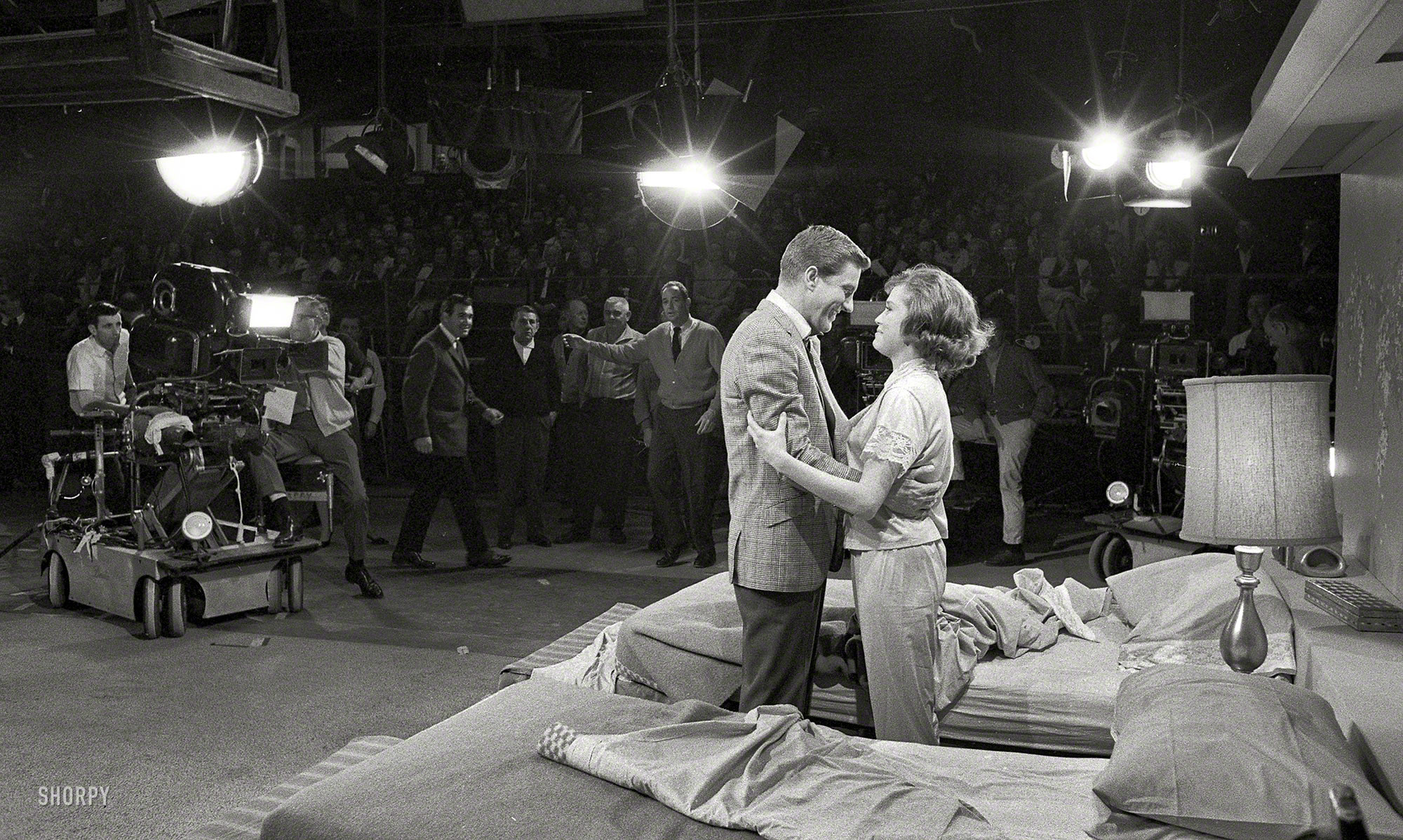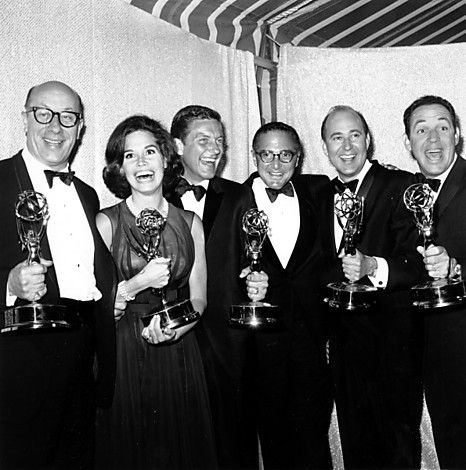Television had been a thing, or at least a thing people used regularly, for about a decade, and by then it was already in almost 90% of American homes. Amazing, right?
The early '60s were still a pretty squeaky-clean time for television, as far as censorship and regulation goes. Think of I Love Lucy, where they weren't even allowed to say the word "pregnant" because the network felt it was too vulgar—even when Lucy was actually pregnant.
Well, in comes The Dick Van Dyke Show, breaking boundaries at every step without really even trying. They faced some push-back from the network, but with persistence and clever loopholes, they managed to capture a sense of reality in every episode that no one else had accomplished before. It ran for five seasons, from 1961-1966, on CBS, and is still popular in syndication, as well as being one of the most well-loved sitcoms ever. It won 15 Emmys for acting, writing, and directing, and was nominated for many more; it was nominated and won at least one award for every season it was on air.
The Dick Van Dyke Show was originally meant to star creator Carl Reiner and was called Head of the Family. The pilot episode of this version is on Netflix for you to watch, but it's so terrible that I'm not sure you really want to. Luckily Reiner realized it wasn't working and set out to find someone else to star.
Lucky for everyone, he found the then-nobody Dick Van Dyke, long before anyone knew him as Bert from Mary Poppins (which, incidentally, is one of my all-time favorite movies). He was starring with Chita Rivera in Bye Bye, Birdie on Broadway at the time, and when Reiner saw him, he knew that he would be perfect: not too good-looking, a little awkward, and all-around lovable. The trouble was, Dick Van Dyke was far from a household name, so Reiner took a pretty big risk putting his name front and center. However, the show eventually became so popular that Dick Van Dyke would be a name no one would forget.
| Public Domain |
In every episode, the characters find themselves in all kinds of silly shenanigans—yet always believable ones. Whether it's a flashback to Rob and Laura's wedding that almost wasn't, or it's Rob losing a script that he, Buddy, and Sally had spent all day working on and then negotiating with a homeless man to get it back, or it's a bird that has taken a liking to little Ritchie's hair for its nest and attacks him every time he comes home from school, there's no shortage of entertainment in every episode.
There are many, many things that work in The Dick Van Dyke Show. Very often when I watch early television, like I Love Lucy, Green Acres, or even something a little later like Bewitched, I find that I enjoy it because it's quaint. It's adorable and old. And sometimes a little bit uncomfortable because of the obviously misogynistic story lines. No matter how scheming Lucy was, Ricky always put her back in her place. I love these shows and find them funny and entertaining, but there's always a part of me that thinks, "Aw, how cute."
This was never the case with The Dick Van Dyke Show. It never felt quaint, despite being over 50 years old. It was just genuinely funny. I laughed out loud all the time.
Carl Reiner was nothing short of genius in the way he put the show together. First and foremost, Reiner made it his goal to capture real life. It wasn't "real" life the way TV portrayed it in many other similar sitcoms. It was real life the way he and the people he knew experienced it. He would ask his crew, his actors, and even his then-young son Rob (who is a great actor, writer, and director in his own right), about things that had happened in their own lives. Much of what happened in Dick Van Dyke came from actual things that happened to people Reiner knew. Reiner has said himself that he never intended to necessarily break any boundaries or be particularly forward-thinking; he was just thinking about real life. Mary Tyler Moore said of the show that the only thing that didn't feel real about it was the fact that Rob and Laura slept in separate beds. Ah, well. You can't win every battle with the networks.
| The character Sally Rogers (Rose Marie) was the first time a single, working woman was shown on television. Also pictured is Morey Amsterdam as Buddy Sorrell, king of the hilarious one-liners. |
Sally Rogers was also a remarkable character. She was a single, working woman, which was absolutely unheard of in entertainment and extremely rare in real life. She was always joking about finding a husband, and she was teased frequently about it, but it was always good-natured, and she was never made out to look like some kind of spinster or whore or anything. Her teasing wasn't any harsher than the treatment Roz Doyle gets on Frasier, and considering the state of the world in the early '60s, that's pretty amazing. Sally was great at what she did, and that, rather than her being single, was her defining characteristic, which honestly is more than I can say about some more recent shows.
Reiner was also aware of the lasting impression The Dick Van Dyke Show could have if he was smart. He intentionally never included political or cultural references or 1960s slang in episodes, because he knew that those would date the show and would make it less likely to withstand the passing of decades. And it's true; once I knew this fact, I looked out for it, and I might have heard a brief reference to an actor or something maybe once or twice, tops. The content is generally timeless and relatable, despite being in an era with very specific visual markers.
The relationships between the characters are also interesting, particularly between Rob and Laura. Unlike many shows (especially I Love Lucy), Rob and Laura genuinely respect each other. They both make decisions together. It's not all up to Rob to be the man of the house and be in charge of everything—they run the house together. And, more than that, they argue. They argue about real problems and petty ones, just like a real couple. This isn't Father Knows Best, where the husband is
And the last major piece of genius from Reiner and the production team was to end it after five seasons, even despite pleas from the public and the network. Especially because at this time every season had at least 30 episodes (compared to the average 22 or even 13 of today), this was a brilliant move to keep the show from, as I've said before, either jumping the shark or simply fizzling out. Reiner didn't even want to have any reunion episodes later on, which I also think is smart, if only because I just personally am not a fan of reunions.
So, overall impression: it's an incredible specimen of television. Maybe not every episode is a complete winner (including the slightly disappointing final episode), but as a whole, this is simply great TV. Not great TV despite its era, just great TV. The writing is witty, clever, and often laugh-out-loud funny (real lols were had!). The characters are endearing, and their relationships are believable. The casting is brilliant. And it's never quaint. The jokes are lasting, the scenarios are lasting, the relationships are lasting. It's no wonder Dick Van Dyke became a household name.
If you've watched The Dick Van Dyke Show, let me know your thoughts! If not, go watch it now, you'll love it!
My favorite episode:
"Obnoxious, Offensive, Egomaniac, Etc," (S5, Ep. 26). Rob, Sally, and Buddy write insulting epithets about Alan Brady in their script while they are writing, something they do every week, but they always ink it out before sending the final script to their egomaniacal boss. However, this particular week they were in a big hurry to finish the script and left it on Alan's desk without remembering to cover up all of their insults! Alan is out of the office, so the three, plus Laura, hope they can get the script back before Alan sees it and without being late for the play they're about to see.
Some Trivia:
- Buddy (Morey Amsterdam) and Mel (Richard Deacon) are notoriously enemies on the show. Buddy is always making fun of Mel's baldness with hilarious one-liners, and Mel always refers to Buddy simply as "Yeuch!" However, Amsterdam and Deacon were actually close friends in real life and came up with many of Buddy's best insults over dinners or between scenes.
- This was the last show to have its entire run in black & white. If it had continued on to a sixth season, it would have converted to color.
- Buddy Sorrell was based on Mel Brooks, who worked as a writer on Sid Caesar's Show of Shows alongside Carl Reiner.
- Alan Brady's face was never shown and his voice was rarely heard for the first three seasons of the show, because Carl Reiner wanted to find a big celebrity to play the part. But by season four, Reiner decided just to play the role himself.
Next up in the series:
Murder, She Wrote
Previously:


